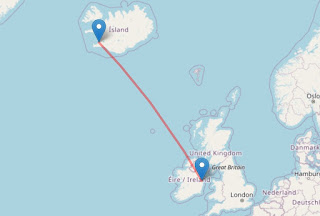I'm catching up with author William Kent Krueger. I've written about books 1-10 in his series of novels featuring detective Corcoran "Cork" O'Connor [see Still Growing (07/2022).] Now I've enjoyed books 11 and 12.
Before there's even a crime, Northwest Angle involves us deeply in Krueger's favorite themes of family, spirituality, and nature. Cork has brought his children, their Aunt Rose, and her husband Mal to a houseboat on a lake, beautiful and remote.
It's not just a vacation. Cork's eldest daughter Jenny is expected to become engaged to a man Cork doesn't trust. Before the suitor joins the party, Cork takes Jenny to the secluded island where, in his teens, he had his vision quest. Rock drawings there represent the importance of children to the tribe. She gets the message that he wants her to consider her future more carefully, and she resents it.
That's when a strong fast-moving windstorm called a derecho separates everyone. Jenny finds shelter in a lone cabin where, inside, an infant boy cries, a woman lies dead, and the rooms have been ransacked. Jenny realizes that the killer, who must have been looking for something particular, is likely nearby. From then on, the baby is in Jenny's care.
Just the adventure of Jenny and Cork finding each other and evading a stalker, while shielding the child, makes a satisfying story in itself.
But then there's the murder investigation. There's an emotional surprise when our perception of a certain character flips 180 degrees, and there's a contest of spiritual strength -- both harrowing and hilarious -- between the vicious matriarch of a hateful Christian sect and Cork's mentor Henry Meloux with his Ojibwe traditions. Then there's Jenny's decision.
A rich read for a detective novel? Just the rich read I've come to expect from Krueger.
First, at age 60, Cork watches his old friend Jubal Little die slowly from an arrow to the heart, evidently one from Cork's own quiver. Jubal is a politician, and was expected to become the first indigenous governor of Minnesota. It happens at Trickster's Point, an island with a rock formation hundreds of feet high, where they'd hunted many times since high school. Naturally, Cork is prime suspect.
The other is a memory from sixth grade of how Cork first met Jubal. Cork was with his friend Willie Crane, a kind boy hindered in gait and speech by cerebral palsy, and Willie's sister Winona, Cork's secret crush. A notorious bully, Donner Bigby, with his entourage, comes up to mock Willie, and Cork considers what to do:
As the son of the Tamarack County sheriff, Cork felt on his shoulders the onerous weight of doing the right thing. Which meant taking on Donner Bigby who was a head taller and thirty or forty pounds heavier and who probably knew more about how to beat the living crap out of a kid than anyone Cork could think of. He considered simply trying to talk his way past Bigby, and hustling Willie and Winona along with him. (12)But then Winona punches Donner. Young Cork is struggling when a stranger, Jubal, comes up from behind, puts Donner in a headlock, and orders the entourage away "or I'll break his neck."
It's the beginning of a beautiful friendship, but there's trouble. Jubal develops a relationship with Winona over the years that wise man Henry Meloux describes as "two halves of a broken stone," marked by a pattern of crackups and reconciliations. Jubal and Cork remain close friends through their years together on the high school football team, but then, Cork explains, "He grew into someone else, the man he always believed he was meant to be, a guy destined for something great. And greatness takes up a lot of space" (181).
While a hostile state official directs the investigation of Cork by his old police friends, Cork tracks down leads among old classmates, all related to that seminal boyhood incident.
On this track between past and present, themes emerge. There's that theme of the effect that "greatness" has on relationships. There are a lot of confessions, not least of which is Jubal's admission to Cork, "I envied you" (181). And nearly every male character is struggling for the approval of his father, even years after the parent's death (207).
Along these lines, Krueger continues to develop Cork's relationship to his son Stephen. With mentoring from the old wise man Henry, Stephen is becoming a healer. In conversation about why a shooter aimed at Cork, Stephen hears Cork say the man was "protecting someone he loves." Stephen picks up the theme:
That's the point. Someone he loves...[S]omeone was ready to kill you, but that doesn't seem to matter to you. You just keep doing what you do. And me and Jenny, we're just sitting around waiting for the time we get a call and some stupid voice on the other end of the line tells us you're dead. (293)The scene ends in tears - Cork's, Stephen's, mine.
I'll confess that I've already forgotten who did it or why. It seemed sensible to me at the time I read it a couple of weeks ago. But I'll remember the relationships and how it felt to be in Cork's world.
[See my responses to other Krueger books]
←← | ← || → Use the arrows to follow the entire series in sequence.


















